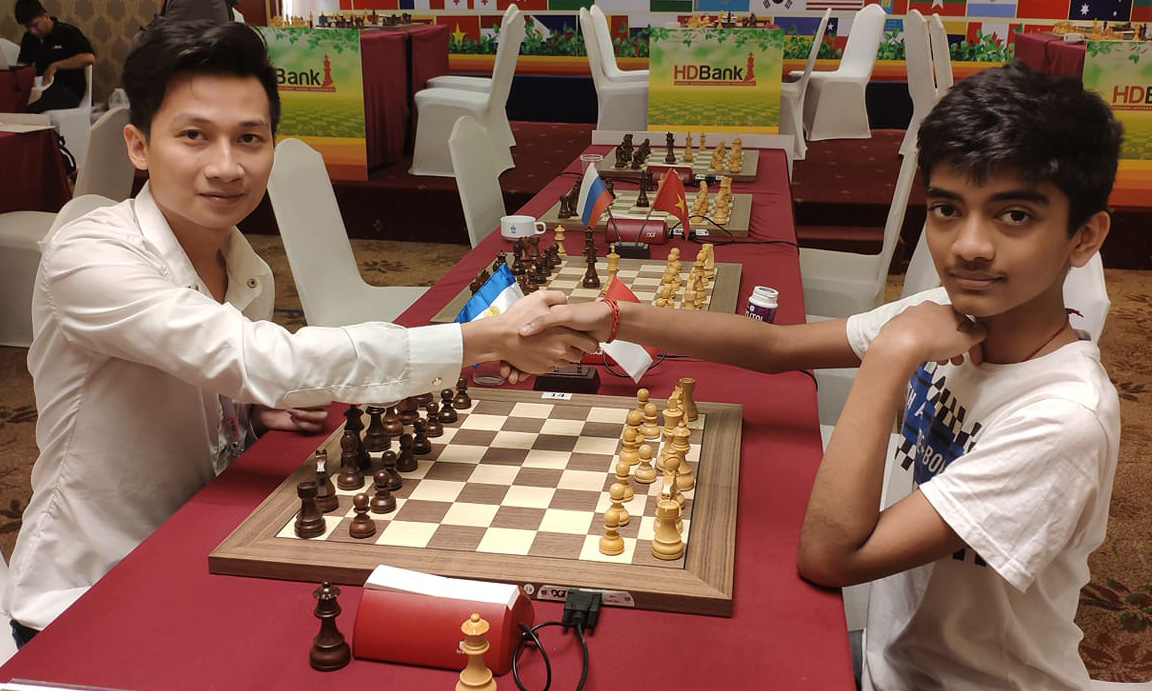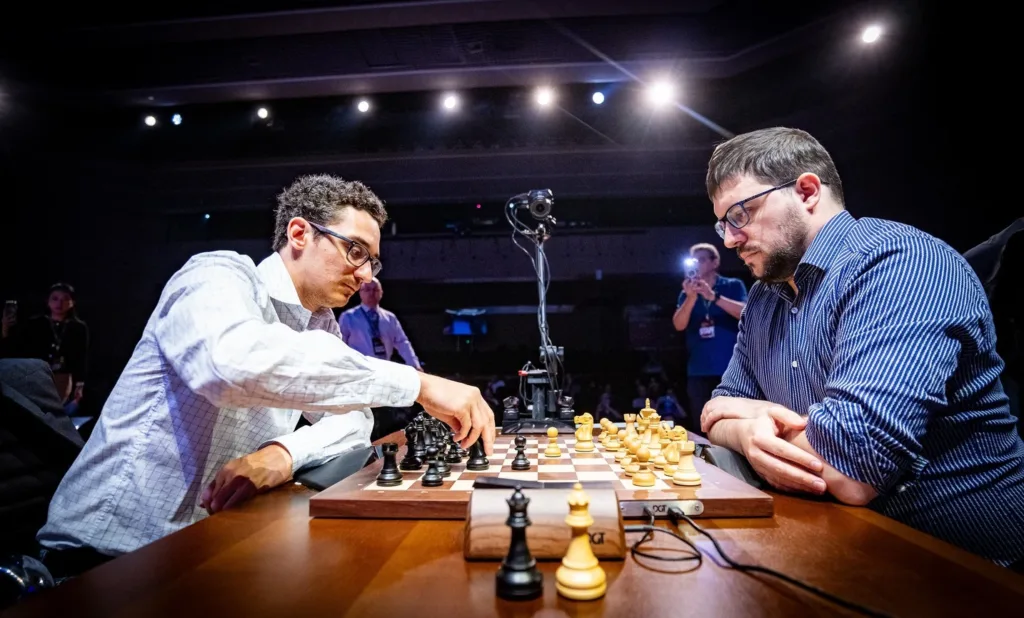The moment Fabiano Caruana sealed his second Grand Chess Tour title in St. Louis on Sunday, he did not raise his arms in triumph or break into a smile. Instead, he leaned back, exhaled, and shook his head slowly, as if to acknowledge the weight of what had just unfolded: not just a tournament win, but a career-defining statement at age 33.
In the finals of the 2025 Tour, Caruana outmaneuvered Alireza Firouzja in a tense rapid playoff after their classical games ended level. It was a match that felt like a passing of the torch — the American veteran against the 22-year-old French-Iranian prodigy — yet it was the older man who steadied his nerves and reminded the chess world that he is not just a bridge between the Carlsen era and the next generation, but a pillar in his own right.
This was not a title secured by accident. Caruana had led throughout the Tour season, outpacing elite rivals like Hikaru Nakamura, Ian Nepomniachtchi, and Ding Liren. By the time he dispatched Firouzja, his consistency had earned him something more enduring than prize money or a trophy: the confirmation that his name belongs among the greats of the modern game.
A Career of Almosts and Resurgences
For years, Caruana has lived in a strange middle ground between glory and heartbreak. To casual fans, he is remembered most for 2018, when he challenged Magnus Carlsen for the world title and pushed the Norwegian to twelve straight draws in classical games before collapsing in the rapid tiebreaks. For purists, he is known for his almost mythic performance at the 2014 Sinquefield Cup, where he started with seven straight wins against the world’s best and posted a 3098 performance rating — still the highest ever at that level.
Yet in the harsh arithmetic of sporting legacies, Caruana had, until this week, too many “almosts” attached to his name. Almost a world champion. Almost the heir to Bobby Fischer as America’s next undisputed king. Almost the conqueror of Carlsen.
The second Grand Chess Tour title begins to rewrite that narrative. This was not the streaky prodigy of 2014 or the challenger of 2018. This was the seasoned, battle-scarred Caruana who has endured a decade of Candidates tournaments, heartbreak, criticism, and self-doubt. The win shows he can still rise above a field that is deeper, younger, and hungrier than ever.
From Brooklyn to the World Stage
Caruana’s story remains one of the most global in modern chess. Born in Miami to Italian parents and raised in Brooklyn, he trained first with the legendary coach Bruce Pandolfini before his family relocated to Madrid to nurture his talent. By 14, he was the youngest grandmaster in Italian history. By 22, he was winning super-tournaments with a dominance not seen since Garry Kasparov.
His dual national identity has always set him apart. He represented Italy for a decade, becoming a hero to that nation’s small but passionate chess community, before returning to the United States in 2015. In doing so, he became the centerpiece of America’s renaissance in chess, joining Nakamura and Wesley So in turning the St. Louis Chess Club into the sport’s new global capital.
Caruana has since won four U.S. Championships, represented his country in Olympiads, and helped deliver America’s first team gold in 40 years at the 2016 event in Baku. But for all the medals and trophies, it is the aura of being perpetually just outside the world champion’s shadow that has defined him.
A Legacy Question Answered
That is why this second Grand Chess Tour title matters. Unlike a one-off tournament, the Tour measures endurance across formats and continents. It rewards not just preparation, but stamina and adaptability. Winning it once might be explained as a hot year. Winning it twice, seven years apart, is a marker of permanence.
Only Carlsen and Nakamura have shown similar staying power in this format. To join that company is to confirm what many insiders have long believed: that Caruana is not simply the best American player of his generation, but one of the top five players of the 21st century.
“Fabiano has been the model of professionalism for more than a decade,” said Yasser Seirawan, the American grandmaster and commentator. “If Magnus was the sun around which everything orbited, then Fabi was the planet that never left its course. This title is proof of his gravitational pull.”
Positioning for the Future
The timing of the triumph also matters. Caruana has already qualified for the 2026 Candidates Tournament, his fifth consecutive appearance. If there were whispers that the younger crop — Firouzja, Nodirbek Abdusattorov, Praggnanandhaa Rameshbabu — had overtaken him, this season’s Tour silenced them.
His current rating of 2789, world No. 3, shows that he remains firmly entrenched in the elite. At 33, he is older than most of his top rivals but still younger than Carlsen, who is only 34. In chess, where peaks can last longer than in most sports, Caruana may yet have a second act as a world title contender.
The victory also comes in a year of reinvention. In early 2025, he signed with Team Liquid, an esports organization, in a move that signaled his willingness to connect with younger, digitally native audiences. He has also become a reliable voice in chess media, offering analysis during online events and candid reflections on his own struggles with pressure and form.
The Shadow of Carlsen — and Beyond
Of course, any discussion of Caruana’s legacy inevitably circles back to Carlsen. The Norwegian remains the measuring stick of the era, and Caruana has spent his career in his shadow.
But perhaps history will remember him differently. If Carlsen is this generation’s Kasparov — dominant, relentless, singular — then Caruana may yet be its Karpov: precise, enduring, and forever present at the highest level. Karpov’s greatness was once diminished by being “the man who wasn’t Kasparov,” but time has softened that judgment. Caruana’s consistency, his professionalism, and now his second Grand Chess Tour title invite a similar reevaluation.
A Career Still Being Written
When asked after the final what the victory meant, Caruana was characteristically understated. “I’m happy I was able to hold it together,” he said. “You play so many events, you don’t always know which ones will matter most in the long run. But this feels special.”
Special, indeed. For a player who has often been defined by what he has not won, this was a reminder of what he has built: a career not of fleeting brilliance, but of sustained excellence.
Caruana will never be the enfant terrible, never the flashy streamer, never the iconoclast. But with two Grand Chess Tour titles, a world championship challenge, four U.S. crowns, and a Sinquefield Cup that still echoes in chess history, he has crafted a legacy of durability, precision, and dignity.
As the lights dimmed in St. Louis, he packed his pieces quietly, shook Firouzja’s hand, and slipped out of the playing hall. It was a typically modest exit. But the record books, indifferent to humility, will note the milestone: Fabiano Caruana, twice Grand Chess Tour champion, and now firmly among the immortals of his time.
Grand Chess Tour Winners
| # | Year | Winner |
|---|---|---|
| 1 | 2015 | Magnus Carlsen (Norway) |
| 2 | 2016 | Wesley So (United States) |
| 3 | 2017 | Magnus Carlsen (Norway) |
| 4 | 2018 | Hikaru Nakamura (United States) |
| 5 | 2019 | Ding Liren (China) |
| 6 | 2021 | Wesley So (United States) |
| 7 | 2022 | Alireza Firouzja (France) |
| 8 | 2023 | Fabiano Caruana (United States) |
| 9 | 2024 | Alireza Firouzja (France) |
| 10 | 2025 | Fabiano Caruana (United States) |
Rewatch the finals here

I’m Xuan Binh, the founder of Attacking Chess, and the Deputy Head of Communications at the Vietnam Chess Federation (VCF). My chess.com and lichess rating is above 2300. Send me a challenge or message via Lichess. Follow me on Twitter (X) or Facebook.

